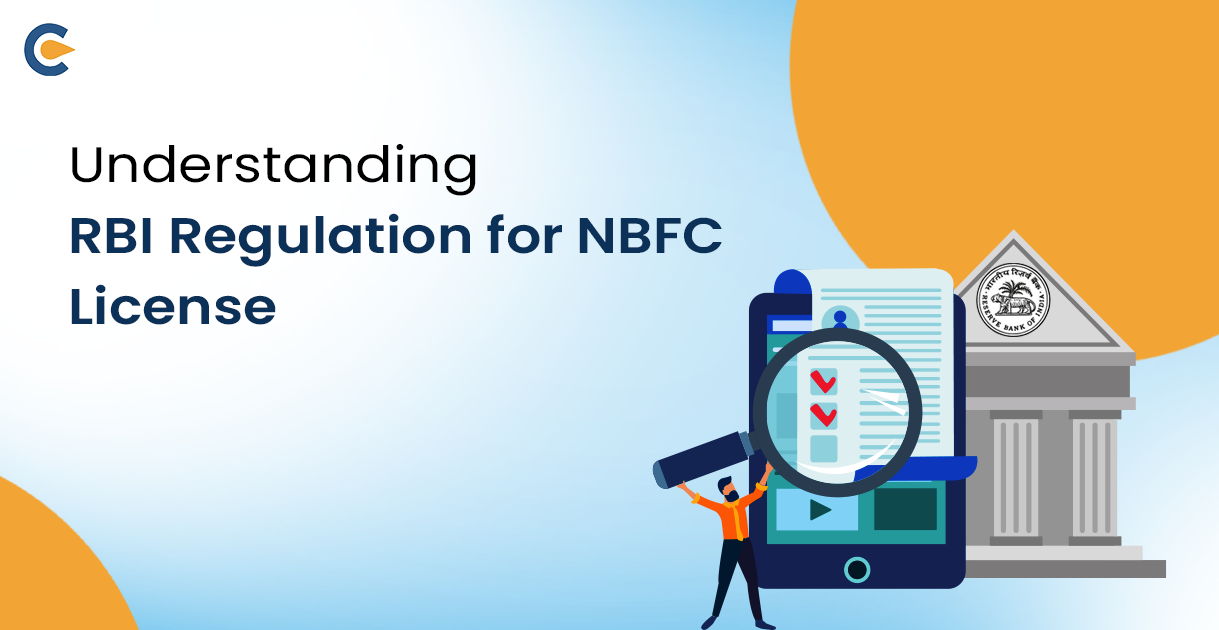An NBFC is a company whose prime business is engaging in lending loans, credits, stock acquisition, equities, debt, etc. Section 45 1(c) of the RBI Act states that an NBFC is a non-banking company that is involved in the financial business. Complying with the RBI Regulation for NBFC License is very important since non-compliance can lead to the cancellation of the license. For NBFC registration, the applicant has to comply with the RBI Regulation for NBFC before and even after the registration. The NBFCs are incorporated under the Companies Act, 2013 or 1956 and are regulated by the RBI. They are governed by both the RBI and the Ministry of Corporate Affairs.
The RBI has set financial criteria to determine if the company is an NBFC or not. This is called the 50-50 test, and it states that for NBFC registration –
- 50% of the total assets of the company should be the Financial Assets and
- The total income of the company should constitute at least 50% of the income from the company’s financial assets.
Guidelines to follow to comply with RBI Regulation for NBFC License
Certain guidelines need to be followed to comply with the RBI regulation for NBFC licenses. These are –
- NBFCs are not able to receive cash deposits payable on demand
- It can take deposits from the public for a period of a minimum of 1 year to a maximum of 5 years.
- The NBFC cannot charge interest that is above the prescribed limit as set by the RBI.
- The RBI doesn’t take any guarantee for the repayment of any amount taken by the NBFC.
- At least 15% of the deposits made by the public have to be kept in the form of liquid assets by the company.
- The company should take the credit rating and submit it to the RBI every six months.
- If a company has public deposits above twenty crores or assets of a hundred crores or more, then it has to give the half-yearly Asset Liability Management return to the RBI.
- The company has to give a certificate from the auditors stating that the company can give back the public money in case of need.
- The NBFC has to provide quarterly returns on its liquid assets.
- Form NBS-1 has to be furnished every year for the statutory returns on deposits by the NBFC.
- RBI requires the NBFC’s annual balance sheet.
Companies not requiring RBI Regulation for NBFC License
Some NBFCs are not required to comply with the RBI Regulation for NBFC License since they are not regulated by them. These companies are-
- Certain core investment companies have assets worth less than a hundred crores or haven’t taken any funds from the public.
- Companies associated with merchant banking or Housing Finance.
- Companies engaged in stock broking business
- Companies engaged in Venture Capital business
- Insurance companies registered under the Insurance Regulatory Department Authority.
- Companies indulged in chit-fund business under the Chit Fund Act, 1982, defined under Section 2(b).
- Nidhi Companies defined in the Companies Act, 2013 and 1956.
Need to comply with the RBI Regulation for NBFC
The RBI Regulation for NBFC is in place to regulate the country’s financial system and make the process smooth and without any fraudulent activities. NBFCs are in the financial business, and that means the important information about the clients is with them, so to safeguard those pieces of information and the trust of the public, compliance with the RBI Regulation for NBFCs is very important. It saves the vital information of the clients and prevents any fraud against them. Compliance with RBI regulations gives potential customers trust in using the services of the NBFC.
Compliance with RBI regulations helps the NBFCs meet their financial obligations in case of need. They need to have certain liquid funds that help them run their business. It reduces the risk of financial deficiency for the NBFC in case of a sudden need for capital. Non-compliance can also lead to the cancellation of the NBFC license.
Penalties for non-compliance of RBI regulation for NBFC
There are penalties that can be levied on the NBFCs in case of non-compliance are –
- If a company doesn’t have an NBFC registration certificate, then it can be penalised with an amount up to Rs. Five Lakhs, or even the double amount of violation (whatsoever is more) by the RBI. The fines imposed can’t be reduced to rupees One Lakh.
- If a company conducts any commercial operation without having the registration certificate for the same, then it would be considered a criminal offence, and the offender can be sentenced for up to one year.
- If the default by the NBFC is in continuation, then the penalty would be Rs.25,000 per day, and if any other violation occurs, then RBI can impose a fine of Rs. 5,000.
- If an NBFC violates regulations set by the Corporation Law Board, a fine of Rs. 50 will be imposed on it every day since the violation is happening. An imprisonment of up to 3 years can also be made.
- If an auditor fails to comply with the RBI regulation, he/ she may be fined up to Rs 5,000.
Conclusion
RBI Regulation for NBFC is very important since non-compliance leads to fines, penalties, imprisonment, or even termination of licenses. No NBFC wants its license to get terminated, and hence, it needs to comply with RBI regulations. The regulations set by RBI are not completely against the NBFCs, and they help them build a company by following a proper procedure that even helps the companies set up.
Corpbiz can help individuals to register the NBFC and to comply with the RBI Regulation for NBFC License. We have a pool of experienced individuals who can provide the best service and help with RBI regulatory compliance.
Frequently Asked Questions
How is the NBFC Financial system better than Banks?
NBFCs provide secured or unsecured loans in considerably less time than banks. The loan approval from NBFC needs very little paperwork and is a quick process where one can even get the loan within a day.
Is there any minimum capital requirement for NBFC registration?
Yes, as per the guidelines by the RBI, any company that can be registered as a company under the Companies Act needs to have a minimum capital of Rs Two crores as per the last audited balance sheet.
What are the documents required for registration as Type II Non-Deposit NBFC?
The documents required for registration as Type II NBFC-ND are –
· Educational and professional qualifications certificate of all the directors.
· Experience Certificate in the field of financial services (if any)What happens when an NBFC doesn’t get registered under RBI?
In case an NBFC doesn’t get registered under RBI, RBI can impose fines, penalties, or even imprison the persons responsible for the act.
What is the function of the NBFC?
The main function of the NBFC is to grant personal loans, consumer loans, housing loans, and auto loans to individuals.
What is the license fee for NBFC registration?
The registration fee for an NBFC is approximately Rs. Three Lakhs Fifty Thousand.
What is the penalty for not having an NBFC registration Certificate?
If an NBFC doesn't have the registration certificate, then it can be penalised with an amount of up to Rs. Five Lakhs, or even the double amount of violation (whatsoever is more) by the RBI. The fines imposed can't be reduced to rupees One Lakh.
Can an NBFC lend money from the bank?
Yes, an NBFC can borrow money from banks based on the capital requirement, which also includes term loans to the NBFCs that are registered with the RBI.
What is meant by the DSA of an NBFC?
DSA is an agent who works for NBFC (or even banks) to refer them for loans to individuals. These agents connect with individuals and get their loans sanctioned by the NBFC in a very short time.
What does AA in NBFC signify?
AA in an NBFC means Account Aggregator. It is an entity that is regulated by the RBI and helps individuals to securely and digitally share or access information from one financial institution to another.
Read Our Article: Complete Checklist for NBFC Compliance











